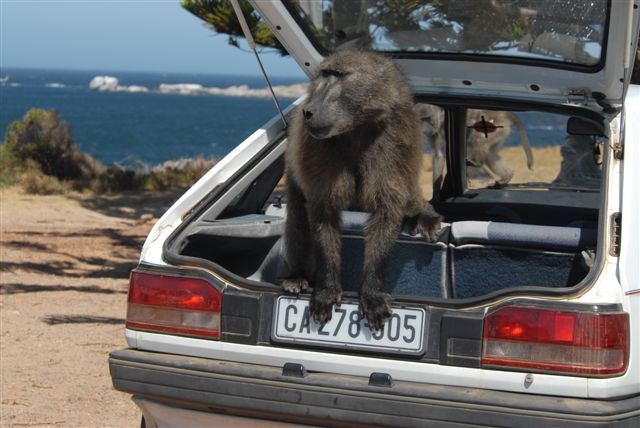
The Department of Zoology and Entomology this year celebrated its annual Duerden Lecture by examining “turf wars between humans and baboons.”
The annual lecture held on 15 May, to celebrate the first head of Zoology at Rhodes and delivered by Dr Justin O’Riain from the University of Cape Town was entitled: Turf wars: can humans and baboons co-exist?
The lecture focussed on the growing problem of baboons and humans sharing a habitat in the Cape Peninsula. Dr O’Riain provided a series of insights into baboon behaviour and ecology.
Through GPS trackers on the 15 major troops on the Cape Peninsula, Dr O’Riain’s research team discovered that baboons in the Cape Peninsula do not inhabit the rocky, mountainous high lying areas. They spend the majority of their foraging and resting time on the lower lying areas; the same low lying areas which are residential and agricultural. Dr O’Riain said this has created a growing conflict of space between baboons and humans.
The research team established that humans and baboons share the same habitat, there are only about 270 baboons on the Cape Peninsula forming 15 troops, and they are not genetically different from other baboons in the Western Cape despite their wide variety of food acquiring accoutrements. Dr O’Riain said due to their increased interactions with humans and the urban lifestyle these baboons have picked up a smorgasbord of parasites and bacteria which could threaten human health.
Dr O’Riain explained that interaction with baboons is inevitable given the limited space on the peninsula but not ideal given the infection potential between humans and baboons. However, there is a possible management solution which involves ‘herding’ the animals into the Cape Point National Park where they can lead a somewhat more ‘organic’ lifestyle.
The lecture gave the audience a fascinating insight into baboons and re-enforced the point that in order to make informed management decisions, ignore the gossip, myths and do research about the animals involved.
Dr O’Riain established a research group at UCT called the Baboon Research Unit to dispel myths about baboons which are rife in the Cape Peninsula and to attempt create informed management policies.
